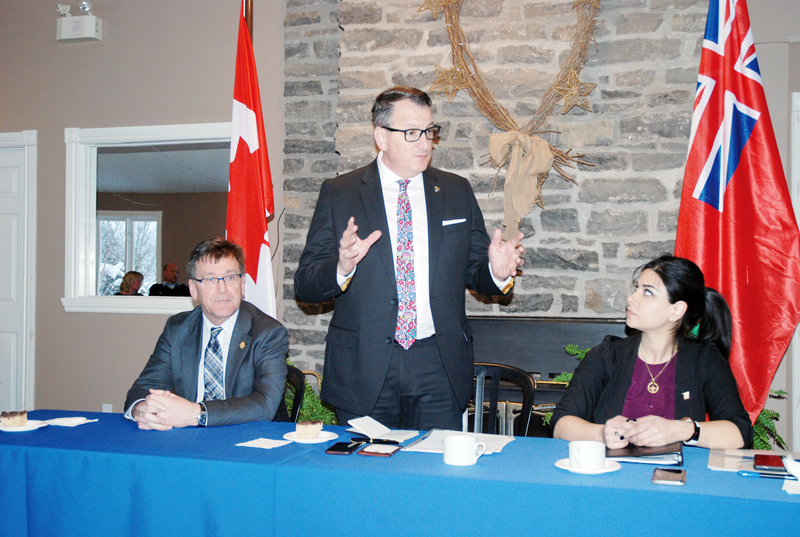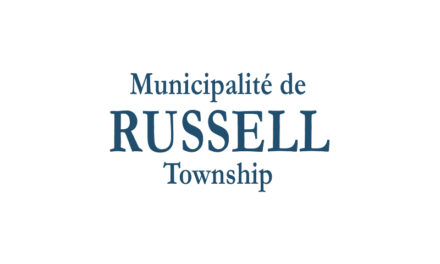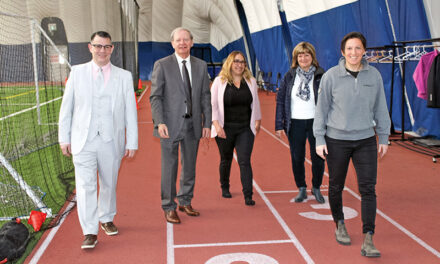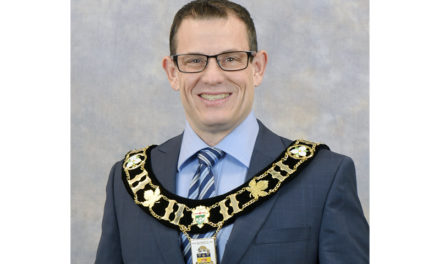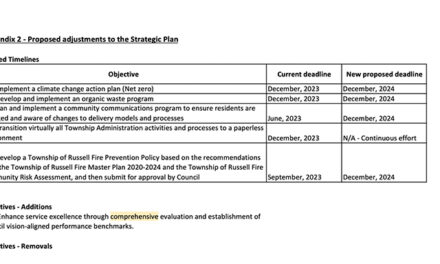Carleton MPP Goldie Ghamari (right) hosted an evening of discussion with area residents at Stanley’s Olde Maple Lane Farm on Feb. 28. Her special guests were MPP Greg Rickford (standing), the minister for energy, mines, and northern development and MPP Bill Walker (left), associate minister of energy. Morin photo
EDWARDS – Concerns about the state of Ontario’s energy markets were front and centre at a roundtable meeting hosted by Carleton MPP Goldie Ghamari at Stanley’s Olde Maple Lane Farm on Fri., Feb. 28.
The event gave local residents and business owners an opportunity to speak to top provincial officials: MPP Greg Rickford, the Minister of Energy, Northern Development and Mines and Minister Indigenous Affairs, and MPP Bill Walker, the Associate Minister of Energy.
The bad winter weather did not keep 30 interested area residents from attending the meeting.
The concerns and challenges raised by attendees reflected what many Ontario residents are concerned with right across the province.
Rickford kicked off the meeting by talking about the unique rural-urban divide that exists in the Carleton riding.
“Taking the ride out here gave Bill and I a deep appreciation for that,” he said. “We have a premier, cabinet and caucus that listen to each other, but to make it clear, we are firmly in your corner when we think about programs you may not be able to access whether you are rural or otherwise,” said Rickford.
Rickford suggested that the province was doing pretty well considering where we started just a couple of years ago.
Anticipating some of the concerns voiced by those at the meeting, Walker stressed that challenging issues in the urban-rural divide could be done, but it would take time. “There are laws and legislation. You can only do so much,” he said.
He stressed that change does not happen overnight.
The main message was that the two ministers and MPP Ghamari were there to listen and learn from Carleton residents.
The concerns from people at the meeting ranged from the challenges of becoming energy independent to how the area is over-regulated when it comes to electricity costs, and billing issues such as “Global adjustment.” There were concerns about how competition in the marketplace is held back by local hydro regulations and how agriculture in the region is negatively affected by electricity rates and policies.
Other questions revolved around the need to have more available natural gas in the area, which, to many small businesses would make a big difference to their bottom line.
Marcel Moncion, owner of Moncion’s Your Independent Grocer in Riverside mentioned the ongoing difference between Ottawa Hydro rates and the more expensive Hydro One costs.
Regarding that issue, Rickford suggested there may be relief of some sort on the way, in the future.
“Today, with our leadership group, we were discussing about some consolidation around some local distribution companies (LDC),” said Rickford.
He explained that the discussion had been about cyber security and resilience, and those issues might make some LDC consolidation necessary. He cautioned that there were some political reasons for the different sizes of LDCs, and the government respected that. He suggested that there might be a need to have more sharing take place between LDCs in terms of more efficient equipment and policies.
“I think there is room for some consolidation, at least in some of the elements they should be delivering to their customers,” said Rickford.
MPP Ghamari explained to the ministers that amalgamation had caused some rural Ottawa residents to be serviced by Hydro One and others by Ottawa Hydro, with two different sets of rates.
Ottawa Osgoode ward councillor George Darouze was also at the meeting and reinforced the idea that the province, he hoped, would look into this situation.
Phil McNee, the CEO of Demand Renewables, which specializes in solar power and renewable energy sources, was concerned about challenging hydro regulations and the difficulty business owners and homeowners face when attempting to making their carbon footprint smaller and becoming more self-sufficient.
“There are two major issues. One is LDCs. If you are a homeowner or business owner and you decide you want to produce your own energy because your hydro bills have been going up exponentially year after year, the hydro companies feel they deserve a piece of your pie,” said McNee.
“On top of the fees they are charging they make, it very difficult to move forward,” he said.
McNee said some farmers have been unsuccessfully trying for years to get solar energy projects done but have failed because of the capacity issue.
Rickford responded, “Solar, in particular, has smaller applications that are pertinent to various kinds of operations in rural settings. Some of the threshold issues you are raising are worth taking a look at.”
John Beking of Beking Poultry Farm said his concern was that he was ready to add solar energy to his operation but the electricity company was telling him there was not enough capacity on the grid for him to send back any excess energy he might produce.
“We put a solar panel on our new barn two years ago and it is working well. We have been trying to put up a solar panel on our main barn for five years now. We would like to produce our own energy,” said Beking.
The issue of availability of natural gas in the area came up with a question from Jonathan Rochon of Rochon Garden in Edwards. “We have 17 greenhouses,” he said. “We use a lot of energy. I feel our area is under-represented. There are two community associations who are talking to Enbridge but I feel like it is pulling teeth getting an answer out of them.”
His questioned why couldn’t the government give them a grant or something similar that they could use to entice Enbridge to put in gas lines to his location.
Associate Minister Walker said, “I assure you that is exactly the kind of question we will be asking them. Why do you say no?”
Rickford said, “Enbridge always has to look at its bottom line and their business case and we are working with them and they have been quite cooperative with us. Enbridge has committed to us that they will come out and do some consultations.”
Rickford said he will be meeting with Enbridge in the near future about this kind of situation not just here but in Northern Ontario as well.
The availability of useful internet services was brought up by MPP Ghamari.
She said, “It is frustrating, even for me when I see other rural ridings get those rural grants for broadband. But, again, we are disqualified because even though we are rural, we are technically within the urban City of Ottawa so we do not get those grants, so that is another thing we are trying to change.”
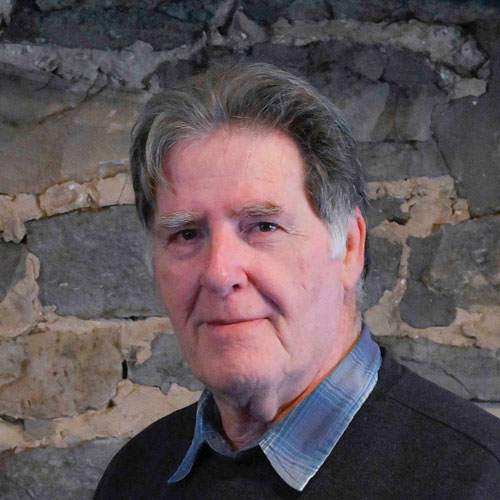
Joseph Morin is the Editor of the Eastern Ontario AgriNews, and the Record. He is, despite years of practice, determined to eventually play the guitar properly. He has served the Eastern Ontario community as a news editor, and journalist for the past 25 years with the Iroquois Chieftain, Kemptville Advance, West Carleton Review, and Ottawa Carleton Review in Manotick. He has never met a book he did not like.

